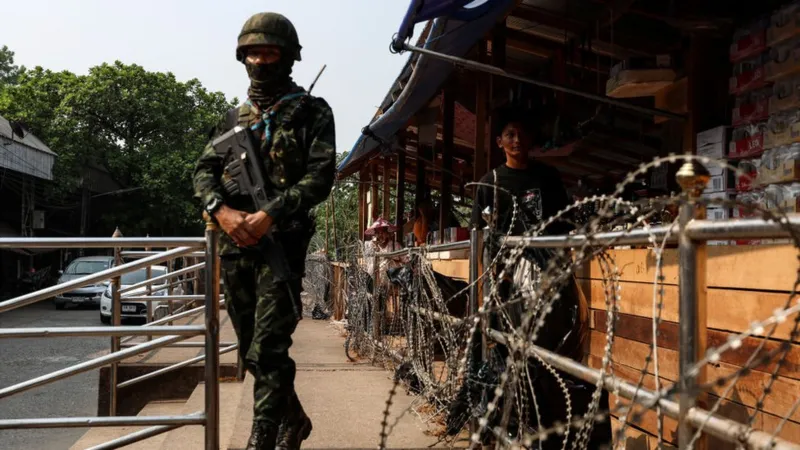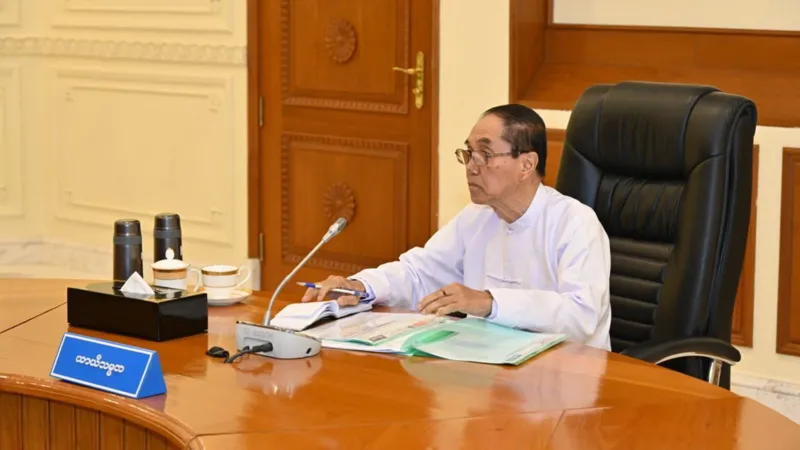Is Myanmar's army reversing its losses? It's complicated
The fortunes of war along Myanmar's border with Thailand have been turning with bewildering speed.

Two weeks after losing control of their base in Myawaddy, a vital border crossing, soldiers loyal to the military junta that seized power in a coup three years ago have retaken it.
The embattled junta, which has suffered a series of humiliating defeats in other parts of the country, appears to have held the line in Myawaddy. But the picture is a lot more complicated than this simple narrative suggests.
The sudden capture by the Karen National Union (KNU) of all the military bases near Myawaddy earlier this month seemed to herald a significant shift in the civil war which erupted after the junta seized power in a coup three years ago.
It was the first time in decades that the KNU, Myanmar's longest-running insurgent group, had controlled the town, a real prize as most of the country's trade with Thailand passes through it, and it is the location of several huge and very lucrative casino complexes.
But the KNU never actually occupied Myawaddy, putting just a small contingent of fighters from allied People's Defence Forces (PDF) to control the Battalion 275 army base, just outside the town. It kept the same police, immigration and local government officials in place to run the town and keep the border trade going.
One reason for the victorious insurgents' reticence was the presence of other, powerful Karen armed militias which had until recently been allied to the military junta, and whose response to the KNU's advance was uncertain. Avoiding clashes between different Karen groups was a priority, says the KNU leadership.
Calculations and considerations
The biggest of these militias calls itself the Karen National Army (KNA), led by Saw Chit Thu, a warlord who broke away from the KNU in the 1990s.
He controls the notorious Shwe Kokko casino complex, which has been accused of hosting abusive scam centres. The money that it generates funds a well-paid and well-equipped private army of several thousand fighters, which since 2010 have been operating as a border guard force supporting the military.
In January Saw Chit Thu announced that he was severing ties with the junta, but the KNU accuses him of helping the soldiers who had been driven out of the Battalion 275 base, but had refused to surrender.
The other reason for the KNU's caution was the military's air power, which has been used to devastating effect in other areas where its ground troops have been defeated. Last weekend Mi35 helicopter gunships and Y12 aircraft bombed KNU positions in Myawaddy, causing a number of casualties and driving thousands to seek shelter on the Thai side of the border.
KNU sources also say they have been asked by the Thai military not to provoke a battle for control of Myawaddy, which would disrupt trade and send a much larger wave of refugees into Thailand.
The KNU leadership ordered its forces to abandon the Battalion 275 base, partly it said, to avoid more destruction in Myawaddy, but also to focus on a much bigger battle 30km (18 miles) to the west of the town.
Stung by the loss of Myawaddy the junta ordered a large column of reinforcements, backed by armoured vehicles and artillery, to re-establish its control over the road to the border. This is the biggest counter-attack attempted by the military since the string of defeats at the hands of ethnic insurgents which began in Shan State in October last year.
KNU fighters have been deployed to ambush the column along the road as it climbs through forested hills outside the town of Kawkareik, slowing its progress to a crawl and destroying a number of vehicles.
The column is, or was, being commanded by General Soe Win, number two in the military hierarchy, a sign of how important its success is to the junta. He has now disappeared from public view, raising speculation that he may have been wounded, or possibly purged by his boss, the junta leader Min Aung Hlaing.
Stopping or driving this column back would represent a far more significant achievement than occupying Myawaddy, ensuring that all access to the border in this area remains under KNU control.
Those seeking to escape the fighting have been queueing up at the Thailand-Myanmar Friendship Bridge
But the KNU faces a number of dilemmas.
It says the number of people displaced by fighting in Karen State has risen to more than 700,000 people since the coup, a staggering half of its population. Escalating the fight against the junta will make that much worse.
It must also maintain unity among its seven armed brigades, which have traditionally exercised a high degree of autonomy in their areas. Before the coup there had been bitter disputes within the KNU over how far to compromise with the central government in the interests of peace and promoting business in one of Asia's most impoverished regions.
The KNU must also now decide what its policy will be towards Myawaddy, the mainstay of the economy in Karen State. Historic mistrust and resentment of Saw Chit Thu's breakaway KNA runs high, and the official KNU view of the casino complexes is that they are a source of transnational crime like human trafficking and should be closed down.
Yet Saw Chit Thu has ambitious plans to expand Shwe Kokko, in partnership with a Chinese company, Yatai, into a giant, cross-border entertainment zone. He is powerful enough to thwart any attempt to shut him down, unless it is backed by Thailand, which provides electricity and telecommunications to Shwe Kokko. But that is unlikely while there are influential Thai figures with a financial interest in the Shwe Kokko project. There are even some senior KNU figures implicated in the casino business.
From discussions with KNU sources it seems the group was not yet ready to handle the complexities of occupying Myawaddy when it found itself in control of the military base there on 11 April.
The KNU has been fighting for a self-governing Karen state for more than 75 years, and its leadership takes a long view of the conflict.
It has already tied its fortunes firmly to the anti-coup resistance movement, nurturing and training the PDFs formed by dissidents fleeing from the cities, and providing a safe haven for the National Unity Government, which represents the administration ousted by the coup.
But co-ordinating the mosaic of ethnic armies, warlords and PDF militias into an all-out assault which can unseat the military junta is a monumental task, the success of which is still far from certain.
-bbc







